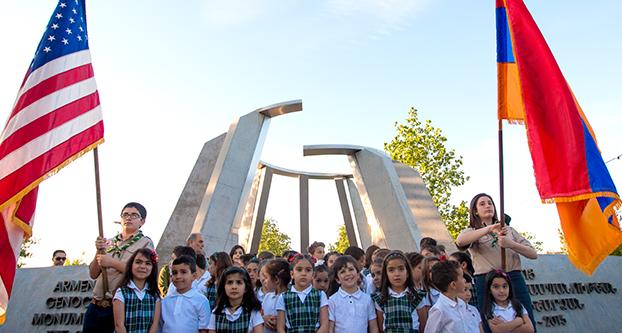For Armenians, April 24 marks a day of remembrance. This year, it was a day to look toward the future.
Tuesday marked 103 years since the beginning of the Armenian Genocide, a massacre that occurred in the former Ottoman Empire from 1915 to 1927. The event claimed the lives of 1.5 million Armenians.
Fresno State commemorated the anniversary at the Armenian Genocide Monument twice, once at noon and then again in the evening.
The ceremony at noon was organized by students, while the evening celebration was organized by the Armenian Genocide Commemorative Committee of Fresno (AGCC) and was named the official community commemoration.
Other cities participated in commemorating the genocide, including Los Angeles, New York and Washington D.C. The Fresno State commemoration celebrated Armenian culture through music, religion and history.
Misak Israelyan sang a triad of Armenian songs. Religious leaders from the Central San Joaquin Valley read from the Bible and led sermons in both Armenian and English. And the victims of the genocide were remembered as “saints and martyrs” by University President Dr. Joseph Castro.
But the keynote speaker, Dr. Khatchig Mouradian, a lecturer in Middle Eastern, South Asian, and African Studies (MESAAS) at Columbia University in New York, shifted the focus from 103 years ago to this Monday.
“It’s difficult to talk about April 24 without talking about April 23,” Mouradian said. He was referring to the recent political revolution that occured in present-day Armenia.
Serzh Sargsyan announced Monday that he was stepping down from his role as Prime Minister of Armenia, 10 days after stepping into the role.
This announcement came after over a week of protesting of what many Armenians felt was Sargsyan’s attempt at claiming power over Armenia for life.
Mouradian used the protestors’ efforts to encourage the youth and drive home their importance in the future.
“Think about yesterday. Think about the fact that of the tens of thousands of people protesting in Armenia, the majority were youth,” Mouradian said.
He added that young people not only define a society’s future but also their present day.
Dr. Sergio La Porta, professor of Armenian studies at Fresno State, said the recent political shifts impacted what is usually a somber anniversary.
“It does breathe a breath of fresh air into the Armenian community, and gives it a sense of hope, and a positive attitude going forward,” La Porta said.
The Armenian Students Organization (ASO) prematurely embodied Mouradian’s message Tuesday afternoon.
The organization’s eight executives silently protested against all of the genocide deniers and demanded it be recognized as a crime against humanity by all.
Zaroohi Der Mugrdechian of AGCC said informing the youth of the facts is an integral part of diminishing the amount of deniers.
They held signs painted with the colors of the Armenian flag that read “Turkey is guilty of genocide,” “Recognize the Armenian Genocide!” and “Turkey failed,” among others.
“We will not yield until our martyrs are recognized,” said ASO president Kara Statler.
But she also argued that recognition was not enough, and that the fight must continue.




